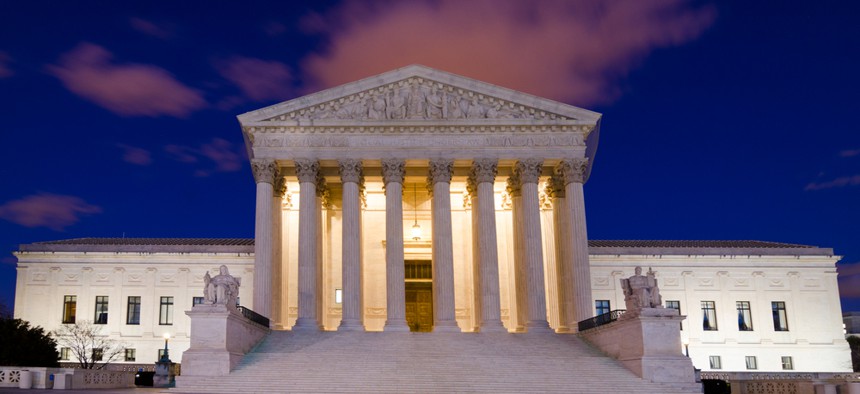Florida, Texas Residents Have the Most to Lose If Obamacare Hits Legal Setback

The U.S. Supreme Court building in Washington, D.C. Orhan Cam / Shutterstock.com

Connecting state and local government leaders
A pending Supreme Court case could drastically impact nearly 8 million people around the nation.
Nearly 8 million people in 37 states will lose their health-care subsidies if the U.S. Supreme Court rules against the federal government in King v. Burwell , the case that has posed a serious threat to the continued viability of the Affordable Care Act.
State-by-state totals of people who signed up for Obamacare in the second enrollment period were released by the U.S. Department of Health and Human Services on Tuesday. Among the 37 states that have used the federal Healthcare.gov system, Florida led with 1.6 million enrollees, followed by Texas, with 1.2 million, and North Carolina, Georgia and Pennsylvania, with numbers in the half-million range.
According to the HHS report , 87 percent of people signing up in the 37 states qualified for federal subsidies—an average tax credit of $263 per month, or $3,156 a year to help defray premium costs.
Total enrollment in all 50 states plus the District of Columbia was just under 11.7 million individuals. That figure will decrease as some people fail to pay their premiums, but increase as people who qualify for a special extended enrollment period sign up. The formal enrollment period ran from Nov. 15, 2014, to Feb. 15, 2015.
But HHS granted an extension through the end of April to people who only learned they’d have to pay a non-coverage penalty while preparing to file their annual tax returns.
Optional answers about race and ethnicity on the Healthcare.gov site indicate that African-Americans accounted for 14 percent of enrollees in the 37 states, and Hispanics 11 percent. But about a third of enrollees did not answer the question, making a true demographic picture of enrollment difficult to calculate.
The Supreme Court heard arguments in King v. Burwell on March 4, and a decision is expected before summer begins. If the ruling goes against the Obama administration, some states may scramble to set up their own exchanges.
Doing so wouldn’t be a leisurely walk through the park.
According to an analysis by Stateline , an initiative of the Pew Charitable Trusts:
The first step would be enactment of a law authorizing a state agency, nonprofit or public-private entity to run the exchange. Next, a state would have to build or acquire a website to enroll residents, take over contracts with insurance carriers, develop a consumer assistance program and create a bureaucracy to operate the exchange.
And that would only work if there’s political initiative and cooperation at the state level to make such an effort work.
Republicans who have been relentlessly critical of Obamacare exercise political control in most of the 37 states where the federal government runs a health care exchange instead of the state government.

( Image courtesy Stateline / Pew Charitable Trusts )
Of the 37 states that opted not to set up their own exchanges, whose citizens therefore used the federal Healthcare.gov, 29 have Republican governors. Six have Democratic (or in Alaska’s case, Independent) governors but legislatures fully controlled by the GOP. They include Alaska, Missouri, Montana, New Hampshire, Pennsylvania and Virginia. In two states—Delaware and Oregon—Democrats occupy the state house and control both legislative chambers.
Meantime, according to a March 10 Washington Post blog post, evidence is accumulating that Republicans would not seek to rescue Obamacare if the Supreme Court strikes down subsidies in the 37 states.
Timothy B. Clark is editor-at-large at Government Executive and is a fellow at the National Academy of Public Administration.





